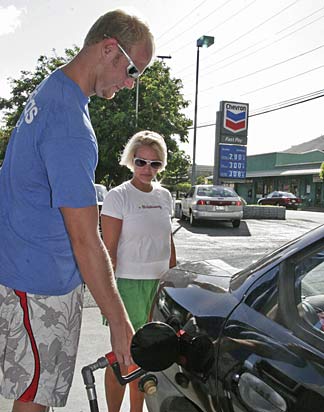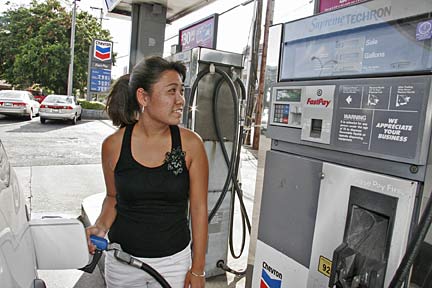
|
Gas cap politics
Hurricane-influenced gasoline
price spikes could affect how
voters view their representatives
in the next election, an analyst says
While nobody knows how much gasoline will cost come Election Day, the next 14 months should give politicians plenty of time to pass the blame or take the credit for how things work out with the first attempt by a state to regulate prices at the pump.
How prices are affected by Hurricane Katrina could play a big role in who's able to win votes, one analyst said.
"That (hurricane) changes the stakes to such an extent that you're really going to have to watch this for a while to see," said Neal Milner, a professor of political science at the University of Hawaii. "I suppose if the prices went way up there might be a backlash, but I think at this stage the Democrats are pretty comfortable and I think the public is pretty comfortable in giving it a shot and seeing what happens."
After years of talk, Hawaii on Thursday became the first state to implement price controls on gasoline.
The price cap legislation first was passed in 2002 and signed into law by then-Gov. Ben Cayetano, a Democrat. Since then, the legislation has been revised twice, despite attempts by Republican Gov. Linda Lingle to repeal the measure.
After the "gas cap" took effect, motorists saw moderate increases at the pumps and braced for potentially larger increases tomorrow.

Chanelle Sakamoto fueled up yesterday at Manoa Chevron Service Inc. in Manoa. She said it wasn't as bad as Maui's gas prices, which were about 50 cents higher.
Current caps were set two weeks ago, before Hurricane Katrina disrupted Gulf Coast oil production and sent fuel costs to new highs nationwide. Caps that take effect tomorrow reflect the price surges in the mainland markets on Monday and Tuesday, and were set 27 cents higher than the inaugural benchmark.
If wholesalers charge up to the maximum allowed and retailers maintain their usual markups, motorists could be looking at prices of about $3.15 a gallon for regular unleaded on Oahu, with higher costs on neighbor islands.
Gas prices in Hawaii and across the country are setting new highs every day.
The statewide average for regular unleaded was at a record $2.95 a gallon on Friday, 2 cents higher than the previous day, according to AAA's Fuel Gauge Report.
Increases in Hawaii were significantly lower than the national average, which jumped 16 cents to a record $2.87 a gallon on Friday, the auto club said. Prices in Michigan, Indiana and Illinois already averaged more than $3 a gallon.
"I think under the circumstances now, whatever confidence people like Sen. (Ron) Menor had ought to be tempered by this terrible disaster," Milner said. "Not that they're necessarily wrong, but there's certainly more of a chance that they can be wrong because of all this uncertainty."
Menor, the Senate Consumer Protection Committee chairman, stands by the price cap, stressing that the measure is aimed at bringing fairness to the pricing structure in Hawaii in the long run.
Supporters allege oil companies have made excessive profits in Hawaii, even though the islands make up a small portion of their sales base. Critics of the legislation say Hawaii's high taxes, isolation and barriers to competition set the market that leads to higher prices.
"My general feeling is that if prices do not change under the cap, then Hawaii's consumers are no worse off than they are now," said Menor (D, Mililani). "However, if the price cap does result in significant savings to consumers, as I anticipate it will, then it was well worth the effort to get the legislation passed."
The gas cap has become a political hot potato even before the 2006 campaign season has begun.
Democrats who passed the law note the governor, under the law, has the power to suspend the price caps if they cause economic hardship or threaten public safety.
The PUC also has broad authority to revise the price cap formula to address situations such as what happened on Kauai last week, when a Princeville station said it was at risk of closing because its supplier said it would not be economically feasible to continue deliveries. The PUC adjusted the formula within a day.
Lingle said the comments from Democrats showed lukewarm support for the measure. "I've never seen legislators so fast to not want to take credit for something they passed," she said.
Milner said Democrats may sound like they are hedging their bets, but they have a point.
"It doesn't hurt them as far as they're concerned -- the Democrats -- that Lingle has to be the one on the point here when she doesn't like the bill in the first place," Milner said. "I think they're certainly playing a little bit of politics there, but in fact the ball is in the administration's court right now."
Lingle said she will closely monitor the price cap's effects on the economy, and her administration set up hotlines for people to call to report any perceived problems.
House Majority Leader Marcus Oshiro said even if the cap fails and the governor steps in, he's confident that support for Democrats will not falter.
"People will appreciate that Democrats tried to address high prices, and it's better to have tried and failed than not to have tried at all," said Oshiro (D, Wahiawa-Poamoho).
Milner said that argument may not wash with voters.
"The idea that you tried something -- in our political culture -- has about as much chance of succeeding as President Bush, or other federal officials, arguing that we know that there's still an enormous problem in New Orleans, but we exercised an unprecedented effort," Milner said. "People get interested in results, and if you develop a set of expectations -- a strong set of expectations, say, on the gas cap -- it's going to be very hard to back away from them."
Lingle has said she hopes Democrats are right and that the law brings down the cost of gas, but she does not believe that will happen.
She said she's not concerned about what it could mean politically if the caps do work.
"I haven't approached this issue in a political way since the beginning," she said. "Otherwise I wouldn't have come out so strongly against it, because you know there's a strong popular sentiment in favor of this because it is seen as doing something.
"Yes, there are going to be political implications, but there are political implications of everything I do," she added. "I don't believe there are many out there who would feel, 'Oh, she wants it repealed because she wants to hurt the consumers.' I don't. I want the same thing -- I want them to be able to deal more effectively with the cost of living."
www.hawaii.gov/budget/puc/gaspricecaps/
AAA Fuel Gauge Report:
www.fuelgaugereport.com
E-mail to City Desk
[News] [Business] [Features] [Sports] [Editorial] [Do It Electric!]
[Classified Ads] [Search] [Subscribe] [Info] [Letter to Editor]
[Feedback]
